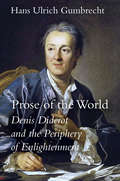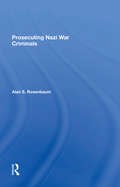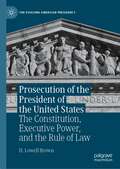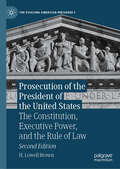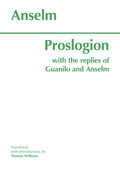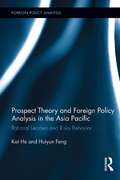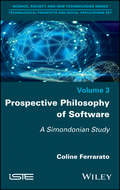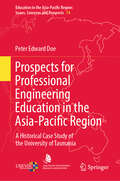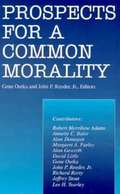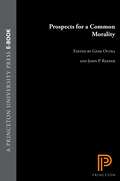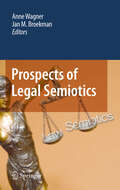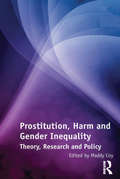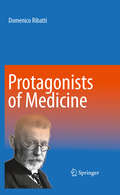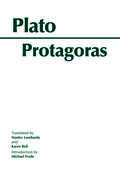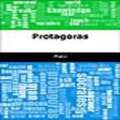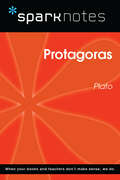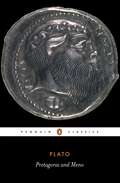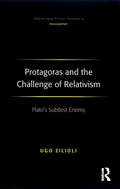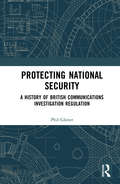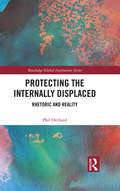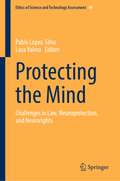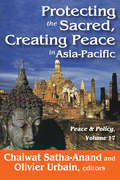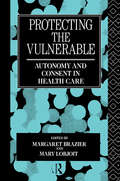- Table View
- List View
Prose of the World: Denis Diderot and the Periphery of Enlightenment
by Hans Ulrich GumbrechtA lively examination of the life and work of one of the great Enlightenment intellectuals Philosopher, translator, novelist, art critic, and editor of the Encyclopédie, Denis Diderot was one of the liveliest figures of the Enlightenment. But how might we delineate the contours of his diverse oeuvre, which, unlike the works of his contemporaries, Voltaire, Rousseau, Schiller, Kant, or Hume, is clearly characterized by a centrifugal dynamic? Taking Hegel's fascinated irritation with Diderot's work as a starting point, Hans Ulrich Gumbrecht explores the question of this extraordinary intellectual's place in the legacy of the eighteenth century. While Diderot shared most of the concerns typically attributed to his time, the ways in which he coped with them do not fully correspond to what we consider Enlightenment thought. Conjuring scenes from Diderot's by turns turbulent and quiet life, offering close readings of several key books, and probing the motif of a tension between physical perception and conceptual experience, Gumbrecht demonstrates how Diderot belonged to a vivid intellectual periphery that included protagonists such as Lichtenberg, Goya, and Mozart. With this provocative and elegant work, he elaborates the existential preoccupations of this periphery, revealing the way they speak to us today.
Prosecuting Nazi War Criminals
by Alan S RosenbaumIt has been nearly fifty years since the collapse of the Nazi regime; is there any longer a point to presenting for the apprehension and prosecution of surviving Nazi war criminals? In this carefully argued book, Alan Rosenbaum makes it clear that there is. He contends that apart from concerns about obligations to the dead or vengeance against the
Prosecution of the President of the United States: The Constitution, Executive Power, and the Rule of Law (The Evolving American Presidency)
by H. Lowell BrownThis book provides a detailed look at the constitutional, historical, and political arguments concerning presidential immunity from prosecution, as well as the opinions of the Office of Legal Counsel that provided the justification for the decision not to prosecute President Trump. Focusing on those opinions, the book examines the constitutional basis of presidential immunity, both textual and historical, as reflected in the deliberations of the 1787 Convention and the ratification debates. The opinions are viewed in the context of the criminal investigations of Presidents Nixon and Clinton that gave rise to those opinions, as well as the pronouncements of the Supreme Court concerning their claims, and those of President Trump to immunity from judicial inquiry. Lastly, the book analyzes presidential immunity in light of the separation of powers, the availability of impeachment, and the discordance between presidential immunity and the rule of law.
Prosecution of the President of the United States: The Constitution, Executive Power, and the Rule of Law (The Evolving American Presidency)
by H. Lowell BrownThis book provides a detailed look at the constitutional, historical, and political arguments concerning presidential immunity from prosecution, as well as the opinions of the Office of Legal Counsel that provided the justification for the decision not to prosecute President Trump. Focusing on those opinions, the book examines the constitutional basis of presidential immunity, both textual and historical, as reflected in the deliberations of the 1787 Convention and the ratification debates. The opinions are viewed in the context of the criminal investigations of Presidents Nixon and Clinton that gave rise to those opinions, as well as the pronouncements of the Supreme Court concerning their claims, and those of President Trump to immunity from judicial inquiry. Lastly, the book analyzes presidential immunity in light of the separation of powers, the availability of impeachment, and the discordance between presidential immunity and the rule of law. This new edition includes audiobook files at the chapter level.
Proslogion: With the Replies of Gaunilo and Anselm
by Anselm Thomas WilliamsThomas Williams' edition offers an Introduction well suited for use in an introductory philosophy course, as well as his own preeminent translation of the text.
Prospect Theory and Foreign Policy Analysis in the Asia Pacific: Rational Leaders and Risky Behavior (Foreign Policy Analysis)
by Kai He Huiyun FengWhy does North Korea behave erratically in pursuing its nuclear weapons program? Why did the United States prefer bilateral alliances to multilateral ones in Asia after World War II? Why did China become "nice"—no more military coercion—in dealing with the pro-independence Taiwan President Chen Shuibian after 2000? Why did China compromise in the negotiation of the Chunxiao gas exploration in 2008 while Japan became provocative later in the Sino-Japanese disputes in the East China Sea? North Korea’s nuclear behavior, U.S. alliance strategy, China’s Taiwan policy, and Sino-Japanese territorial disputes are all important examples of seemingly irrational foreign policy decisions that have determined regional stability and Asian security. By examining major events in Asian security, this book investigates why and how leaders make risky and seemingly irrational decisions in international politics. The authors take the innovative step of integrating the neoclassical realist framework in political science and prospect theory in psychology. Their analysis suggests that political leaders are more likely to take risky actions when their vital interests and political legitimacy are seriously threatened. For each case, the authors first discuss the weaknesses of some of the prevailing arguments, mainly from rationalist and constructivist theorizing, and then offer an alternative explanation based on their political legitimacy-prospect theory model. This pioneering book tests and expands prospect theory to the study of Asian security and challenges traditional, expected-utility-based, rationalist theories of foreign policy behavior.
Prospective Philosophy of Software: A Simondonian Study
by Coline FerraratoComputer software (operating systems, web browsers, word processors, etc.) structure our daily lives. Comprising both a user interface and the electronic circuits of the machine it is printed to, software represents a hybrid object at the crossroads of materiality and immateriality. But is it, strictly speaking, a "technical object"? By examining the status of software against the criteria of philosophy of classic techniques, in particular that of Gilbert Simondon, this book lays the groundwork of a philosophical reflection on this subject. Further, in order to help introduce readers to problematics, lines of code and explanatory schemas have been provided.
Prospects for Professional Engineering Education in the Asia-Pacific Region: A Historical Case Study of the University of Tasmania (Education in the Asia-Pacific Region: Issues, Concerns and Prospects #74)
by Peter Edward DoeThis book examines professional engineering education in the Asia-Pacific region in the context of the history of the Faculty of Engineering at the University of Tasmania. It chronicles the development of professional engineering education at the University of Tasmania following the establishment of schools/faculties of engineering in Australia and New Zealand in the late 1890’s. For its 100th anniversary celebration, former graduates of the university were invited to contribute a written or oral ‘pitch’ on their experience as undergraduates and their subsequent careers a engineers, managers, and leaders. Their stories, reproduced in this book, show a deep appreciation of their time as students. Their careers are a testament to their training. In the second decade of the 21st century, the style of learning and teaching at universities changed dramatically. First, there was the change to student-centered teaching, then followed the move to online delivery which was consolidated through COVID-19. Constructive alignment followed with delivered material aligned to Intended Learning Outcomes, assessment tasks and Engineers Australia Stage 1 Competencies for Professional Engineers. Post COVID-19, there has been a slow return to face-to-face teaching. This is a particular challenge for engineering students because of the need for ‘hands on’ experience in laboratories. This book examines the challenges in training engineers for the future and considers the future of professional engineering education.
Prospects for a Common Morality
by Gene Outka John P. Reeder<p>This volume centers on debates about how far moral judgments bind across traditions and epochs. Nowadays such debates appear especially volatile, both in popular culture and intellectual discourse: although there is increasing agreement that the moral and political criteria invoked in human rights documents possess cross-cultural force, many modern and postmodern developments erode confidence in moral appeals that go beyond a local consensus or apply outside a particular community. Often the point of departure for discussion is the Enlightenment paradigm of a common morality, in which it is assumed that certain unchanging beliefs inhere in the structure of human reason. Whereas some thinkers continue to defend this paradigm, others modify it in diverse ways without abandoning entirely the attempt to address a universal audience, and still others jettison virtually all of its distinguishing features. <p>Exhibiting a range of positions Western participants take in these debates, this volume seeks to advance the substance of the debates themselves without prejudging the outcome. Rival assessments of the Enlightenment paradigm are offered from various philosophical and theological points of view. In addition to the editors, the contributors include Robert Merrihew Adams, Annette C. Baier, Alan Donagan, Margaret A. Farley, Alan Gewirth, David Little, Richard Rorty, Jeffrey Stout, and Lee H. Yearley.</p>
Prospects for a Common Morality
by Gene Outka and John P. ReederThis volume centers on debates about how far moral judgments bind across traditions and epochs. Nowadays such debates appear especially volatile, both in popular culture and intellectual discourse: although there is increasing agreement that the moral and political criteria invoked in human rights documents possess cross-cultural force, many modern and postmodern developments erode confidence in moral appeals that go beyond a local consensus or apply outside a particular community. Often the point of departure for discussion is the Enlightenment paradigm of a common morality, in which it is assumed that certain unchanging beliefs inhere in the structure of human reason. Whereas some thinkers continue to defend this paradigm, others modify it in diverse ways without abandoning entirely the attempt to address a universal audience, and still others jettison virtually all of its distinguishing features. Exhibiting a range of positions Western participants take in these debates, this volume seeks to advance the substance of the debates themselves without prejudging the outcome. Rival assessments of the Enlightenment paradigm are offered from various philosophical and theological points of view. In addition to the editors, the contributors include Robert Merrihew Adams, Annette C. Baier, Alan Donagan, Margaret A. Farley, Alan Gewirth, David Little, Richard Rorty, Jeffrey Stout, and Lee H. Yearley.
Prospects of Legal Semiotics
by Jan M. Broekman Anne WagnerThis book examines the progress to date in the many facets - conceptual, epistemological and methodological - of the field of legal semiotics. It reflects the fulfilment of the promise of legal semiotics when used to explore the law, its processes and interpretation. This study in Legal Semiotics brings together the theory, structure and practise of legal semiotics in an accessible style. The book introduces the concepts of legal semiotics and offers an insight in contemporary and future directions which the semiotics of law is going to take. A theoretical and practical oriented synthesis of the historical, contemporary and most recent ideas pertaining to legal semiotics, the book will be of interest to scholars and researchers in law and social sciences , as well as those who are interested in the interdisciplinary dynamics of law and semiotics.
Prosthetic Immortalities: Biology, Transhumanism, and the Search for Indefinite Life (Posthumanities #71)
by Adam R RosenthalExamining the links between today&’s ideas of radical life extension and age-old notions of immortality From Plato&’s notion of generation to Derrida&’s concept of survival to such modern phenomena as anti-aging treatments, cryogenics, cloning, and whole-brain uploads, Adam Rosenthal&’s Prosthetic Immortalities shows how the dream of indefinite life has always been a technological one: a matter of prosthesis. He argues that every biological instance of perpetual life, from one-celled organisms to rejuvenating jellyfish to Henrietta Lacks&’s &“immortal&” cancer cells, always results in the transformation of the original being. There can, therefore, be no certainty of immortality. Yet, because finite mortal life is already marked by difference, division, and change, as Rosenthal concludes: &“the problem of immortality will not cease to haunt us.&” Prosthetic Immortalities examines the persistence of humans&’ aspirations of deathlessness, showing that the link between immortalization and prostheticization is not unique to a single period but is, rather, a ubiquitous element of the discourse of immortality, encompassing both modern technoscientific efforts and religious discourses of an afterlife. Rosenthal asks to what extent the emergence of a virtual, posited, immortal presence follows from the tenets of empirical science—and not simply from the discourse of biology but also, and more radically still, from biological organization itself. Rosenthal ultimately argues that the discovery of biological immortals—lifeforms that naturally have indefinitely long lifespans, such as cancer cells and bacteria—present novel conceptual difficulties for traditional philosophical approaches to mortality and selfhood, asking whether it is life itself that first births immortalizing prostheses.
Prostitution, Harm and Gender Inequality: Theory, Research and Policy
by Maddy CoyProstitution, Harm and Gender Inequality brings together international research exploring the range of gendered harms to women involved in prostitution and the consequences of growth of the sex industry for global gender relations. While there is an increasing amount of research and academic output on prostitution, the current focus is often on discussion and critique of policy frameworks, and contemporary debates over harm are largely limited to sex trafficking and sexual exploitation of children. Less attention is paid to questions of how the sex industry perpetuates notions of objectification and male entitlement with respect to sexual access to women's bodies, despite being key feminist concerns for several decades. This position has become effectively marginalized, but the global growth and industrialization of the sex industry requires a return to these questions. Through exploring gendered inequality and re-engaging with an understanding of prostitution as harmful with impacts on the self and body that are experienced as abusive but do not always constitute violence, this book introduces a range of research and thinking, while also drawing on existing literature to explore the consequences of prostitution for women in the sex industry and wider gender relations. These issues are discussed with regard to: coercion and recruitment, including trafficking; notions of male entitlement in accounts of men who buy sex; critical interrogations of agency and choice; legal and policy frameworks; and representations of prostitution in popular culture.
Protagonists of Medicine
by Domenico RibattiThe study of medical history is interesting in itself and may help to modify the view sometimes expressed that medical students and doctors are lacking in culture of any sort. Moreover, some historical perspective is often advantageous when one is considering the multitude of advances that are now taking place in the theory and practice of medicine. This book, containing a series of collected papers concerning immunology and pathology and vascular biology and angiogenesis, drives us through scientific milestones in the history of medicine in the course of the past two centuries and highlights the contribution of pioneering scientists whose discoveries have paved the way to many researchers working in the fields of cell biology, developmental biology, immunology, pathology, and oncology. This book will serve as a resource for scientists, historians of medicine and philosophers of science and medicine.
Protagoras
by Plato Stanley Lombardo Michael Frede Karen BellLombardo and Bell have translated this important early dialogue on virtue, wisdom, and the nature of Sophistic teaching into an idiom remarkable for its liveliness and subtlety. Michael Frede has provided a substantial introduction that illuminates the dialogue's perennial interest, its Athenian political background, and the particular difficulties and ironic nuances of its argument.
Protagoras
by PlatoTrajectory presents classics of world literature with 21st century features! Our original-text editions include the following visual enhancements to foster a deeper understanding of the work: Word Clouds at the start of each chapter highlight important words. Word, sentence, paragraph counts, and reading time help readers and teachers determine chapter complexity. Co-occurrence graphs depict character-to-character interactions as well character to place interactions. Sentiment indexes identify positive and negative trends in mood within each chapter. Frequency graphs help display the impact this book has had on popular culture since its original date of publication. Use Trajectory analytics to deepen comprehension, to provide a focus for discussions and writing assignments, and to engage new readers with some of the greatest stories ever told. "Protagoras" is a discussion by Plato between Protagoras, a sophist, and Socrates.
Protagoras (SparkNotes Philosophy Guide)
by SparkNotesProtagoras (SparkNotes Philosophy Guide) Making the reading experience fun! SparkNotes Philosophy Guides are one-stop guides to the great works of philosophy–masterpieces that stand at the foundations of Western thought. Inside each Philosophy Guide you&’ll find insightful overviews of great philosophical works of the Western world.
Protagoras and Meno
by PlatoExploring the question of what exactly makes good people good, Protagoras and Meno are two of the most enjoyable and accessible of all of Plato's dialogues. Widely regarded as his finest dramatic work, the Protagoras, set during the golden age of Pericles, pits a youthful Socrates against the revered sophist Protagoras, whose brilliance and humanity make him one the most interesting and likeable of Socrates' philosophical opponents, and turns their encounter into a genuine and lively battle of minds. The Meno sees an older but ever ironic Socrates humbling a proud young aristocrat as they search for a clear understanding of what it is to be a good man, and setting out the startling idea that all human learning may be the recovery of knowledge already possessed by our immortal souls.
Protagoras and the Challenge of Relativism: Plato's Subtlest Enemy (Ashgate New Critical Thinking in Philosophy)
by Ugo ZilioliProtagoras was an important Greek thinker of the fifth century BC, the most famous of the so called Sophists, though most of what we know of him and his thought comes to us mainly through the dialogues of his strenuous opponent Plato. In this book, Ugo Zilioli offers a sustained and philosophically sophisticated examination of what is, in philosophical terms, the most interesting feature of Protagoras' thought for modern readers: his role as the first Western thinker to argue for relativism. Zilioli relates Protagoras' relativism with modern forms of relativism, in particular the 'robust relativism' of Joseph Margolis, gives an integrated account both of the perceptual relativism examined in Plato's Theaetetus and the ethical or social relativism presented in the first part of Plato's Protagoras and offers an integrated and positive analysis of Protagoras' thought, rather than focusing on ancient criticisms and responses to his thought. This is a deeply scholarly work which brings much argument to bear to the claim that Protagoras was and remains Plato's subtlest philosophical enemy.
Protecting National Security: A History of British Communications Investigation Regulation
by Phil GloverThis book contends that modern concerns surrounding the UK State’s investigation of communications (and, more recently, data), whether at rest or in transit, are in fact nothing new. It evidences how, whether using common law, the Royal Prerogative, or statutes to provide a lawful basis for a state practice traceable to at least 1324, the underlying policy rationale has always been that first publicly articulated in Cromwell’s initial Postage Act 1657, namely the protection of British ‘national security’, broadly construed. It further illustrates how developments in communications technology led to Executive assumptions of relevant investigatory powers, administered in conditions of relative secrecy. In demonstrating the key role played throughout history by communications service providers, the book also charts how the evolution of the UK Intelligence Community, entry into the ‘UKUSA’ communications intelligence-sharing agreement 1946, and intelligence community advocacy all significantly influenced the era of arguably disingenuous statutory governance of communications investigation between 1984 and 2016. The book illustrates how the 2013 ‘Intelligence Shock’ triggered by publication of Edward Snowden’s unauthorized disclosures impelled a transition from Executive secrecy and statutory disingenuousness to a more consultative, candid Executive and a policy of ‘transparent secrecy’, now reflected in the Investigatory Powers Act 2016. What the book ultimately demonstrates is that this latest comprehensive statute, whilst welcome for its candour, represents only the latest manifestation of the British state’s policy of ensuring protection of national security by granting powers enabling investigative access to communications and data, in transit or at rest, irrespective of location.
Protecting the Internally Displaced: Rhetoric and Reality (Global Institutions)
by Phil OrchardToday, there are over 40 million conflict-induced internally displaced persons (IDPs) globally, almost double the number of refugees. Yet, IDPs are protected only by the soft-law Guiding Principles on Internal Displacement at the global level. Instead of a dedicated international organization, IDPs receive protection and assistance only through the UN’s cluster approach. Orchard argues that while an international IDP protection regime exists, many aspects of it are informal, with IDP issues bound up in a humanitarian regime complex that divides the mandates of key organizations and even the question of IDP status itself. While the Guiding Principles mark an important step forward, implementation of laws and policies based on them at the domestic level remains haphazard. Action at the international level similarly reflects an all-too-often ad hoc approach to IDP issues. Through an in-depth examination of IDP efforts at the international level and across the forty states which have adopted IDP laws and policies, Orchard argues that while progress has been made, new and greater monitoring and accountability mechanisms at both the domestic and international levels are critical. This work will be valuable to scholars, students, and practitioners of forced migration, international relations theory, and the Responsibility to Protect doctrine.
Protecting the Mind: Challenges in Law, Neuroprotection, and Neurorights (Ethics of Science and Technology Assessment #49)
by Luca Valera Pablo López-SilvaThis book offers a comprehensive analysis of philosophical, social, ethical, and legal challenges arising as a consequences of current advances in neurosciences and neurotechnology. It starts by offering an overview of fundamental concepts such as mental privacy, personal autonomy, mental integrity, and responsibility, among others. In turn, it discusses the influence of possible misuses or uncontrolled uses of neurotechnology on those concepts, and, more in general, on human rights and equality. Then, it makes some original proposals to deal with the main ethical, legal, and social problems associated to the use of neurotechnology, both in medicine and in everyday life, suggesting possible policies to protect privacy, neural data, and intimacy. Crossing the borders between humanities, natural sciences, bio-medicine, and engineering, and taking into account geographical and cultural differences, this book offers a conceptual debate around policy and decision making concerning some of the key neuroethical challenges of our times. It offers a comprehensive guide to the most important issues of neurojustice and neuroprotection, together with a set of new paradigms to face some of the most urgent neuroethical problems of our times.
Protecting the Sacred, Creating Peace in Asia-Pacific (Peace And Policy Ser.)
by Chaiwat Satha-Anand Olivier UrbainUsing case studies from the Middle East, South Asia, Southeast Asia, and the Pacific Basin, this book examines the global trend of violence against religious places and figures. The contributors believe attacks on sacred places to be particularly damaging to peace and harmony because of the centrality of religion in many Asian and Pacific countries.A diverse range of topics are covered, including an empirical exploration of the global trends of violence against sacred spaces; attacks against and policies toward holy sites in Israel and the Palestinian Territories; the fate of Indian Islamic monuments after India gained independence in 1947; the Christian community's response to the increasing Islamization of Malaysia, and the future of communalism in Malaysia. Africa and Australia are also referenced in the work.Taken together, this volume explores the importance of protecting sacred spaces, holy symbols, and religious people as a crucial element in fostering peace in the world, and especially the Asia-Pacific region. The contributors argue that much of the violence in the world is rooted in politics of religious identity.
Protecting the Vulnerable: A Reanalysis of Our Social Responsibilities
by Robert E. GoodinIn this book, Robert E. Goodin speaks on our special responsibilities toward our families, friends, clients, compatriots, etc., that are relatively strong moral claims with restricted scope. He adds, vulnerability of the beneficiary rather than any voluntary commitment per se on the part of the benefactor which generates these special responsibilities and we should always strive to protect the vulnerable.
Protecting the Vulnerable: Autonomy and Consent in Health Care (Social Ethics and Policy)
by Margaret Brazier Mary LobjoitThe right of adults with sound mind to consent to treatment or risk their own health for the benefit of the community in a clinical trial is unequivocally recognised by the law. But what about those vulnerable by virtue of their age, nature or position in society? Experts from the fields of medicine, philosophy, theology and law, explore the ethical and legal principles which seek to reconcile the individual's right to autonomy with the need to protect vulnerable groups. Discussions refer both to specific groups (premature babies, children, people with mental handicaps) and specific issues (cases of abuse by sterilization of women, suicide, the right to information).
